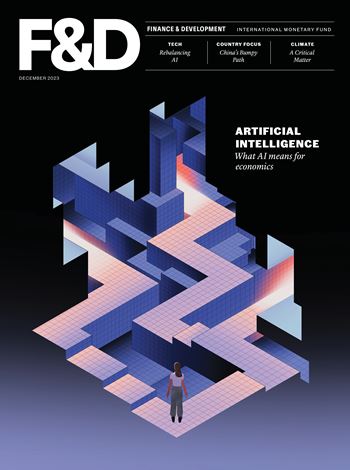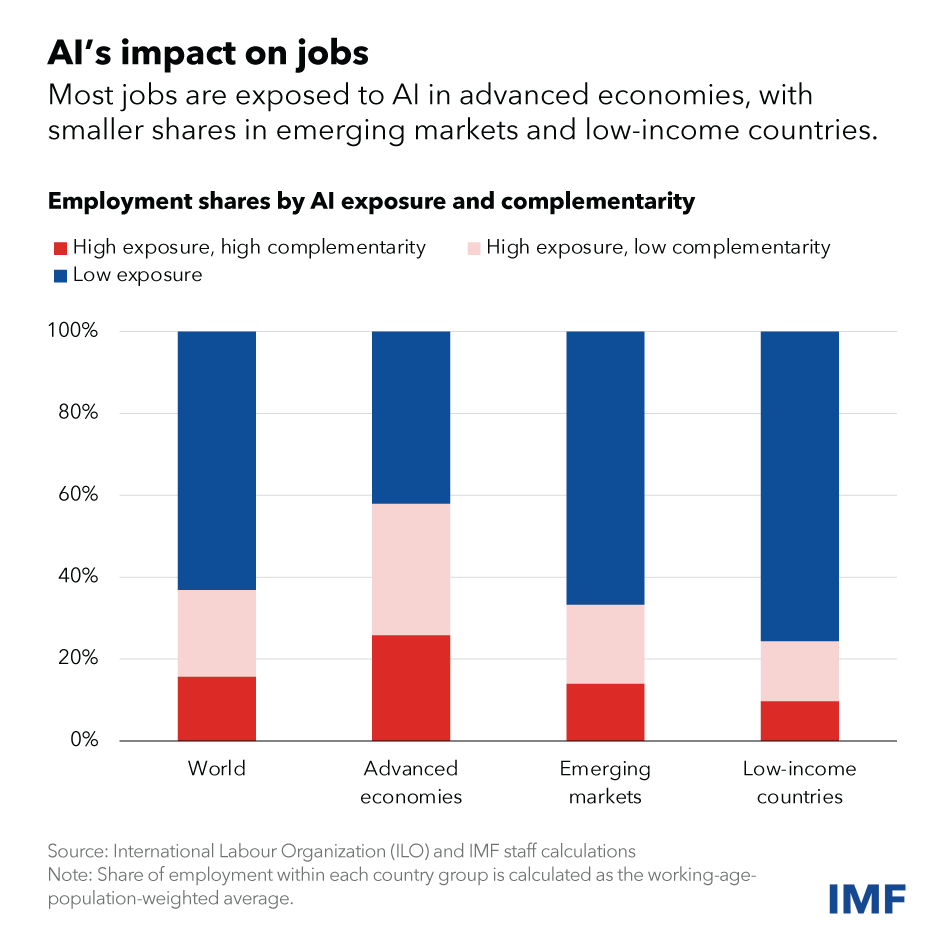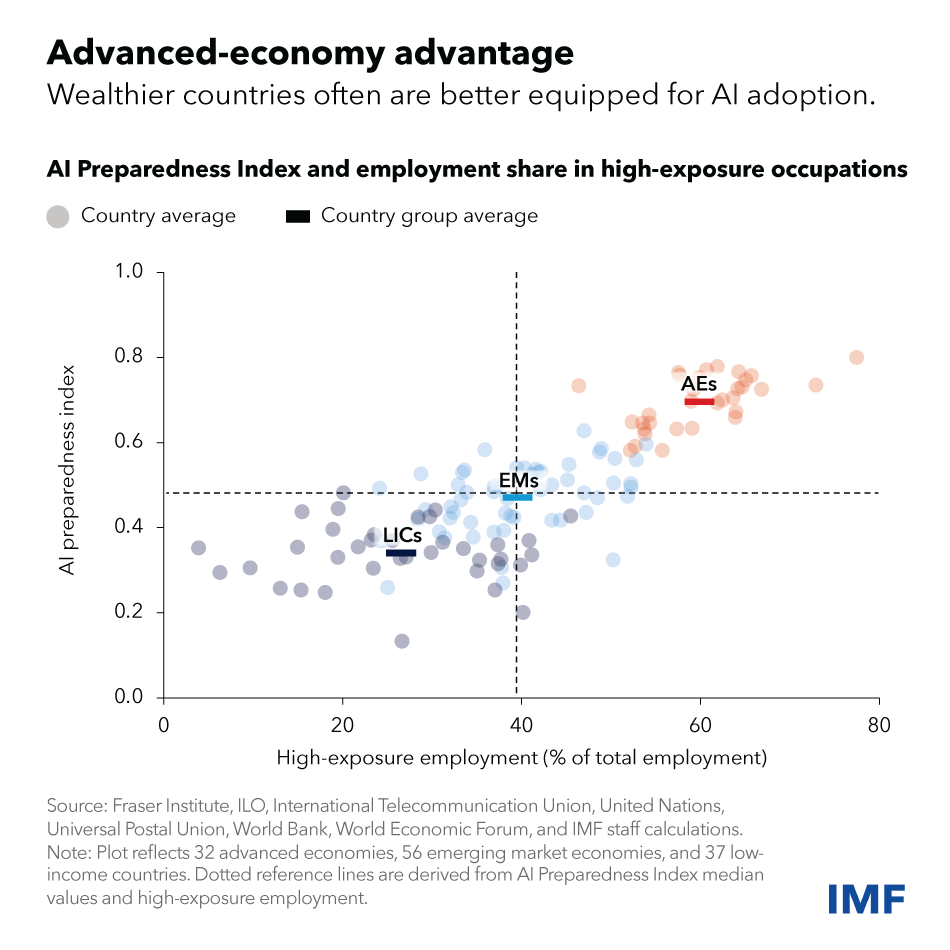We are on the verge of a technological revolution capable of stimulating productivity, enhancing global growth and increasing incomes around the world. However, it can displace jobs and deepen inequality.
Rapid advances in artificial intelligence have captivated the world, arousing excitement and alarm, and raising important questions about its potential impact on the global economy. The net impact is difficult to predict, because AI will spread across economies in complex ways. What we can say with some confidence is that we will need to come up with a set of policies to safely harness the enormous potential of AI for the benefit of humanity.
Reshaping the nature of work
In a new analysis, IMF experts examine the potential impact of artificial intelligence on the global labor market. Many studies have predicted the possibility of jobs being replaced by artificial intelligence. However, we know that in many cases AI is likely to complement human work. The IMF's analysis captures both of these forces.
The results were astonishing: nearly 40% of global employment is exposed to AI. Historically, automation and information technology have tended to impact routine tasks, but one of the things that sets AI apart is its ability to impact highly skilled jobs. As a result, advanced economies face greater risks from AI – but also greater opportunities to benefit from its benefits – than emerging market and developing economies.
In advanced economies, about 60% of jobs may be affected by AI. Nearly half of exposed jobs may benefit from AI integration, boosting productivity. For the other half, AI applications may take on key tasks currently performed by humans, which could lead to lower demand for labor, leading to lower wages and lower employment. In extreme cases, some of these functions may disappear.
In contrast, exposure to AI in emerging markets and low-income countries is expected to reach 40% and 26%, respectively. These results suggest that emerging markets and developing economies face less immediate disruption from AI. At the same time, many of these countries do not have the infrastructure or skilled workforce to harness the benefits of AI, raising the risk that the technology will over time exacerbate inequality between countries.
AI can also impact income and wealth inequality within countries. We may see polarization between income groups, with workers who can harness AI seeing increases in their productivity and wages – and those who cannot fall behind. Research shows that artificial intelligence can help less experienced workers improve their productivity more quickly. Younger workers may find it easier to take advantage of opportunities, while older workers may have difficulty adapting.
The impact on labor income will depend largely on the extent to which AI complements higher-income workers. If AI significantly complements high-income workers, it could lead to a disproportionate increase in their labor income. Moreover, productivity gains from companies adopting AI are likely to boost returns on capital, which may benefit high-income earners as well. These two phenomena can exacerbate inequality.
In most scenarios, AI will likely worsen overall inequality, a troubling trend that policymakers must proactively address to prevent technology from further inflaming social tensions. It is crucial that countries work to create comprehensive social safety nets and provide retraining programs for vulnerable workers. By doing so, we can make the transition to AI more inclusive, protect livelihoods and reduce inequality.
An all-encompassing world driven by artificial intelligence
AI is being integrated into businesses around the world at remarkable speed, underscoring the need for policymakers to act.
To help countries formulate the right policies, the IMF has developed the AI Readiness Index, which measures readiness in areas such as digital infrastructure, human capital and labor market policies, innovation and economic integration, and regulation and ethics.
For example, the human capital and labor market policies component assesses elements such as years of schooling and mobility in the labor market, as well as the proportion of the population covered by social safety nets. The Regulation and Ethics component assesses the adaptability of digital business models to a country's legal framework and the presence of strong governance for effective enforcement.
Using the index, IMF experts assessed the readiness of 125 countries. The results reveal that richer economies, including advanced economies and some emerging market economies, tend to be better equipped to adopt AI than lower-income countries, although there is significant variation between countries. Singapore, the United States and Denmark scored highest on the index, based on their strong results in all four categories tracked.
Guided by insights from the AI Readiness Index, advanced economies should prioritize AI innovation and integration while developing strong regulatory frameworks. This approach will create a safe and responsible AI environment, helping to maintain public trust. For emerging markets and developing economies, the priority should be to lay a strong foundation through investments in digital infrastructure and a digitally competent workforce.
We are approaching the age of artificial intelligence, and we can still ensure that it brings prosperity to all.
—To learn more about AI and the economy, see the December issue of Finance and Development, the IMF's quarterly magazine.




